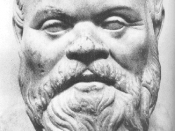The vast importance of ethics is indicated by the fact that much of life consists of a series of choices. Choices are made between alternatives, and one alternative will have to be favored over others in the practice of choosing. This means that there is right and wrong conduct. The choice may involve matters that do not strike us as significantly moralyet reflection will disclose that there is no fundamental difference between moral and supposedly nonmoral choices: all choices have to do with ethics; it is only in their relative importance that they differ.
Bribery is one of the main tools of corruption. It is the corrupt practice of inducing a person to act contrary to accepted or moral behavior, by promising or giving a reward or inducement, often a financial one(Herman,1993) Bribery can be used by private parties to "buy" many things provided by central or local governments, or officials may seek bribes in supplying those things, such as, Government contracts, Government benefits, Lower taxes, Licenses,
This essay will put the emphasis on business ethics.
There are two classic and modern philosophical ethics regarding how to determine the ethical character of actions. One argues that actions have no intrinsic ethical character but acquire their moral status from the consequences that flow from them. The other claims that actions are inherently right or wrong. This two ethics school called teleological, and deontological.
Teleological Theory
Teleological, sometimes called consequential methods. According to Pratley(1996), it is based on estimating what the likely outcomes of a given course of action will be, and then choosing the method that has the most positive consequences and the fewest negative consequences. It is originated by the British thinker Jeremy Bentham (1748-1832) and refined by John Stuart Mill (1806-1873).
Utilitarianism
John Stuart Mill's Utilitarianism is usually seen...


